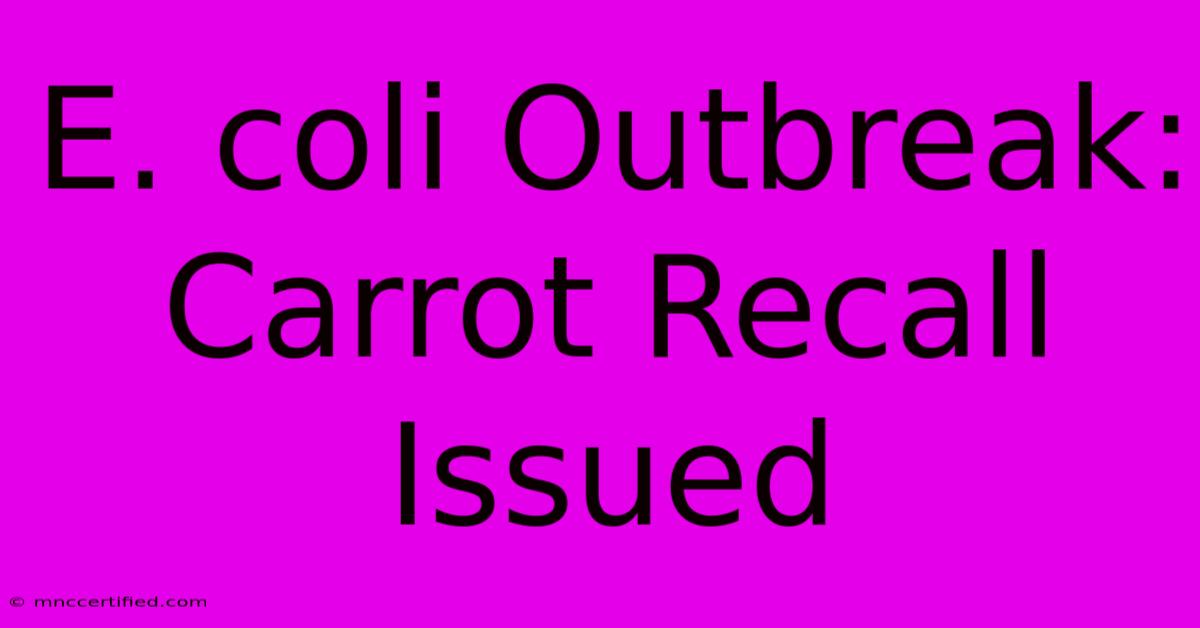E. Coli Outbreak: Carrot Recall Issued

Table of Contents
E. coli Outbreak: Carrot Recall Issued – What You Need to Know
A concerning E. coli outbreak has led to a widespread recall of carrots, prompting urgent action from health officials and consumers alike. This article provides crucial information about the outbreak, the recalled products, and steps you can take to protect yourself and your family.
Understanding the E. coli Outbreak
E. coli, short for Escherichia coli, refers to a large group of bacteria, most of which are harmless and even live in our intestines. However, some strains, like the one causing this outbreak (often specified as a serotype, such as O157:H7), produce toxins that can lead to severe illness. This outbreak is particularly worrying due to its potential for serious complications.
Symptoms of E. coli infection can range from mild to severe. Mild symptoms might include diarrhea (often bloody), stomach cramps, and vomiting. Severe cases can result in hemolytic uremic syndrome (HUS), a life-threatening condition affecting the kidneys. Children, the elderly, and those with weakened immune systems are at higher risk of developing serious complications.
Recalled Carrot Products and Identification
The recall affects a wide range of carrot products from various brands and distributors. It's crucial to check the product label carefully. The specific details of the recalled products, including brand names, product codes, and "best by" dates, are typically announced through official government websites and press releases from the Food and Drug Administration (FDA) or other relevant health agencies (like the USDA in the case of carrots that might be used in prepared meats, for example). Always refer to these official sources for the most up-to-date information, as the recall may expand or change.
Key things to look for on product labels include:
- Brand name: Pay close attention to the brand name printed on the packaging.
- Product code: Look for a specific product code or lot number associated with the recall.
- "Best by" or "use by" date: The recall often covers carrots with specific date ranges.
- Place of origin: The source of the carrots might be indicated on the packaging.
Protecting Yourself from E. coli Contamination
The most effective way to protect yourself from E. coli contamination is to properly handle and prepare food.
- Check for recalls: Regularly check the FDA website and other official sources for announcements of food recalls.
- Wash produce thoroughly: Wash all fresh produce, including carrots, under running water before consumption. Scrub the carrots firmly with a brush to remove any dirt or potential contaminants.
- Cook thoroughly: If using carrots in cooked dishes, ensure they are cooked to a safe internal temperature.
- Practice good hygiene: Wash your hands thoroughly with soap and water after handling raw produce and before eating.
- Avoid cross-contamination: Keep raw carrots separate from other foods to prevent cross-contamination.
- Refrigerate promptly: Store carrots properly to prevent bacterial growth.
What to Do if You Think You're Infected
If you experience symptoms of E. coli infection after consuming carrots, seek medical attention immediately. Early diagnosis and treatment are crucial to preventing serious complications. Inform your doctor about your possible exposure to contaminated carrots.
Staying Informed About the Recall
This outbreak highlights the importance of staying informed about food safety recalls. Regularly check official government websites and subscribe to email alerts from relevant agencies to receive timely updates about recalls and food safety advisories. Your health and the health of your family depend on it.
Keywords: E. coli outbreak, carrot recall, food recall, food safety, E. coli symptoms, hemolytic uremic syndrome (HUS), FDA recall, food poisoning, foodborne illness, carrot contamination, food safety tips, food hygiene, produce safety.
(Note: This article is for informational purposes only and does not constitute medical advice. Always consult a healthcare professional for any health concerns.)

Thank you for visiting our website wich cover about E. Coli Outbreak: Carrot Recall Issued. We hope the information provided has been useful to you. Feel free to contact us if you have any questions or need further assistance. See you next time and dont miss to bookmark.
Featured Posts
-
Hanson Insurance Agency Hanson Ma
Nov 19, 2024
-
Does Boat Insurance Cover Sinking
Nov 19, 2024
-
Dune Prophecy Episode 1 Hidden Details
Nov 19, 2024
-
Russias Response To Bidens Missile Plan
Nov 19, 2024
-
Florida Bad Faith Insurance Claim
Nov 19, 2024